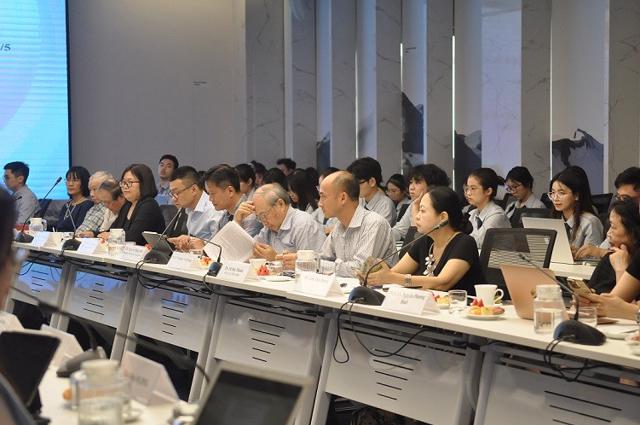

The seminar was chaired by Dr. Nguyen Hung Son, vice president of Diplomatic Academic of Vietnam with the participation of representatives from units of the Ministry, scientists, research experts, research agencies of the Ministry of Foreign Affairs and other Ministries, departments, and branches.
Delivering an opening speech at the seminar, Dr Nguyễn Hung Sơn emphasized that methods and skills play crucial roles in international relations research of Vietnam, especially in the context of unpredictable changes in the world and Vietnam’s preparation for building the foreign policy of the 14th Party Congress. In today’s practice, new methods and skills have appeared in international relations research with the development of science, technology, and artificial intelligence; therefore, using the appropriate methods and skills is of great importance, helping international relations research to achieve better outcomes.
At the seminar, scientists and researchers presented many profound and comprehensive presentations on the importance of scientific research methods and skills in international relations in Vietnam.
Accordingly, methods and skills assist in evaluating comprehensively, making accurate assessments and forecasts, solving international problems, and enabling researchers to correctly perceive problems on a scientific basis. There is a need to strengthen the use of quantitative methods to improve the quality of scientific research in international relations, complement qualitative methods, and collect, and analyze systems with data, statistics, data mining and simulation.
Additionally, the speakers also discussed the challenges in research methods and skills of international relations, specifically, the lack of international relations theory and research methodology in Vietnam. International relations research is featured as interdisciplinary, multidisciplinary, and transdisciplinary, in which the research question is of significant importance.
Participants shared experiences and approaches when conducting research, processing and absorbing information, in which national interests are determined to be the ultimate and most sacred principle. However, research resources are still limited, it is expected that students will have opportunities to get access to research methods to early cultivate, absorb, and become the next generation of research teams with high capabilities and grand passion.
During the discussion, participants provided multidimensional points of view and perspectives on scientific research methods and skills in international relations. The method is both theory and practice, a tool and solution, and a process path to achieve the proposed research goals. Participants argued that research work should be selective, focused, and independent thinking. Historical, comparative and systematic research are the basis for predicting the future and brightening Ho Chi Minh’s diplomatic school.
Delivering a closing speech for the seminar, Dr Nguyen Hung Son concluded that it is vital to build a theory and a solid ideological foundation, organize, make best use of information, overcome oneself in research work, and apply quantitative, discourse, historical, comparative and other methods. According to Dr Nguyen Hung Son, there is a need to “study” the research work and build a theoretical system as General Secretary Nguyen Phu Trong wholeheartedly devoted himself to building and researching a school of diplomacy imbued with the identity of “Vietnamese bamboo.”
*Some photos of conference


